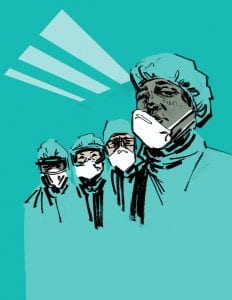By Prof Judy Laing, Professor of Mental Health Law, Rights and Policy (University of Bristol Law School)
 Mental Health Awareness week is an important time to reflect on how the Covid-19 pandemic is generating a global crisis in mental health. Earlier this month, the United Nations published a policy brief warning that: ‘Although the Covid crisis is, in the first instance, a physical health crisis, is has the seeds of a major mental health crisis as well.’
Mental Health Awareness week is an important time to reflect on how the Covid-19 pandemic is generating a global crisis in mental health. Earlier this month, the United Nations published a policy brief warning that: ‘Although the Covid crisis is, in the first instance, a physical health crisis, is has the seeds of a major mental health crisis as well.’
Stringent lockdown measures have increased social isolation, and for many, this is creating huge psychological distress. That is further impacted by the fear of infection, death and losing relatives and close friends to the virus. The state of the economy is creating additional anxiety and stress for those who have lost or are at risk of losing their income and livelihoods. Professor David Gunnell (a colleague at the University of Bristol who researches on suicide and self-harm) has highlighted with others in The Lancet that the pandemic will ‘leave many people vulnerable to mental health problems and suicidal behaviour, and increased risks of suicide’. Taking action now to prevent the risk of suicide is therefore imperative. And the United Nations policy brief also urges national governments to take positive action to ensure widespread availability of mental health support, as well as building mental health services for the future to promote recovery from the pandemic. (more…)



